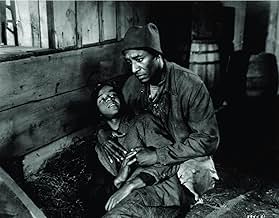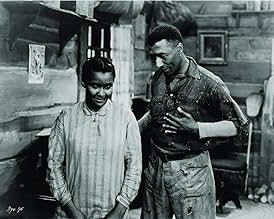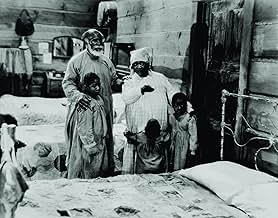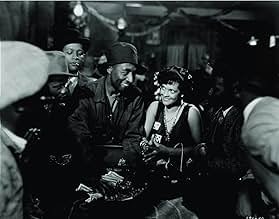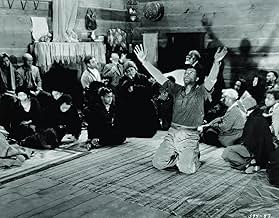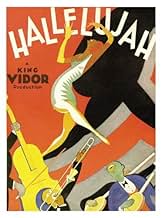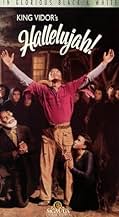VALUTAZIONE IMDb
6,7/10
2141
LA TUA VALUTAZIONE
Aggiungi una trama nella tua linguaA sharecropper decides to become a preacher after falling for a vamp from the city.A sharecropper decides to become a preacher after falling for a vamp from the city.A sharecropper decides to become a preacher after falling for a vamp from the city.
- Regia
- Sceneggiatura
- Star
- Candidato a 1 Oscar
- 3 vittorie e 1 candidatura in totale
Matthew 'Stymie' Beard
- Child
- (non citato nei titoli originali)
Evelyn Pope Burwell
- Singer
- (non citato nei titoli originali)
Eddie Conners
- Singer
- (non citato nei titoli originali)
William Allen Garrison
- Heavy
- (non citato nei titoli originali)
Eva Jessye
- Singer
- (non citato nei titoli originali)
Sam McDaniel
- Adam
- (non citato nei titoli originali)
Clarence Muse
- Church Member
- (non citato nei titoli originali)
Recensioni in evidenza
A film that has a lot to unpack, and a lot to consider. It was made with an all-black cast by director King Vidor with what I believe were good intentions, has some fantastic performances, and tells a good story, but it touches a nerve with its stereotypes. What was liberal in 1929 is known to be backwards today, and this is what makes it such a complicated film. I enjoyed it for its positives and would suggest viewers not dismiss the film entirely, but I'll start with acknowledging the problematic parts, at least the way I see them, FWIW.
As African-American intellectuals like Lorraine Hansberry, James Baldwin, and others explained it so well in the late 1950's, one of the mechanisms white Americans used to cope with the outrageous horror of slavery after it ended was to continue thinking of blacks as somehow different than human. An outright racist considered them lesser, inferior beings. Well-intentioned liberals often embraced the idea that they were a simple, rhythmical people, steeped in Christianity, and possessing a deep wellspring of forgiveness. This reduced the collective guilt over a horror which simply could not be faced, and which to this day has not been reconciled. The liberal view of the day, what we see manifested in this film, is of course preferable to what we might see from someone like D.W. Griffith, but either characterization is dangerous, and robs African-Americans of their humanity.
In the film, the characters are way too happy being poor and picking cotton. I mean, it's better than 'Gone with the Wind', where they're happy to be the slaves of masters who are portrayed as benevolent and genteel, but it still falls into the trap of thinking of them as just simple folk who like to dance after a long day in the field. See, they're all free and happy now, slavery is over, and we certainly don't need to think about some form of reparations for our part in 300+ years of slavery and the death of upwards of 100 million Africans. The film is trying to give its mostly white audience a window into African-American life, similar to how the 'expedition' films from the period presented Polynesians, Inuits, etc ... many of which were made with cultural condescension, and it's telling that there are no white characters, discriminating against them or terrorizing them, as if they were in their own little bubble, or on an island somewhere. And unfortunately, coming along with the singing, dancing, and revival preaching are stereotypes. One of the worst is in the way the main character (Daniel L. Haynes) simply cannot control himself around women, and one (Nina Mae McKinney) in particular. Even though we may see some of that in white individuals from other films (Lionel Barrymore as a preacher in 'Sadie Thompson' from 1928 comes to mind), here it's associated with such a negative stereotype, the sexual aggressiveness of black men, and amplified by Haynes's eyes twitching in tight shots.
On the other hand, I think we have to give the film and Vidor some credit too. To make his first sound picture with an all-black cast is impressive. The main story line could have been based on white characters, and we see a range of human emotion and folly. The musical performances and the dancing from the main characters and various others are excellent. Daniel L. Haynes has quite a presence, and his deep voice and preaching style might just convert you if you're not careful. I loved his imitating a train chugging down the tracks in one of his sermons. Nina Mae McKinney is a revelation too - so well-cast, conveying depravity, wildness, deceit, and contrition all very well. It's all the more impressive considering she was just 17 years old when the film came out, and 16 when it was filmed. The acting is a little uneven, consistent for the period, but one thing I noticed was that the performances are uniformly less reserved and restrained, and that along with pretty damn good sound quality results in more energy and vibrancy on the screen - especially as it compares to other early talkies in 1929 and 1930, many of which are incredibly creaky and brittle. I had a little bit of the same feeling I had about 'Stormy Weather' (1943), another film containing stereotypes, that the performances transcended the narrow framework they were placed in.
Because of all of the concerns about race, I think some of Vidor's great shots in the film get overlooked. He shows us the cotton ginning process, and Haynes up on a huge lumber saw cutting long boards from a tree. He gives a shot of a fantastic drummer in a ragtime band, throwing and catching his sticks as he plays. He shows us the orgiastic gyrations of a wild church scene with excellent camera work, and gives us a chase through a swamp that was likely influential to other filmmakers. Lastly, while McKinney's character falls into the age-old (and misogynistic) temptress type, we also see that she can take care of herself, in one scene beating the hell out of a guy with a fireplace poker after he tries to force himself on her, which despite the violence was frankly great to see.
The bottom line though ... was this film a step forward? That's hard for me to answer. It's worth seeing and the dialog which probes a little deeper than the extreme positions (e.g. distilling it down to "old-timey racism" or "what's the problem, there's no racism here") is worthwhile. If you want to get a better window into the African-American experience from this period, however, you should check out 'Within Our Gates' (1920) by director Oscar Micheaux.
As African-American intellectuals like Lorraine Hansberry, James Baldwin, and others explained it so well in the late 1950's, one of the mechanisms white Americans used to cope with the outrageous horror of slavery after it ended was to continue thinking of blacks as somehow different than human. An outright racist considered them lesser, inferior beings. Well-intentioned liberals often embraced the idea that they were a simple, rhythmical people, steeped in Christianity, and possessing a deep wellspring of forgiveness. This reduced the collective guilt over a horror which simply could not be faced, and which to this day has not been reconciled. The liberal view of the day, what we see manifested in this film, is of course preferable to what we might see from someone like D.W. Griffith, but either characterization is dangerous, and robs African-Americans of their humanity.
In the film, the characters are way too happy being poor and picking cotton. I mean, it's better than 'Gone with the Wind', where they're happy to be the slaves of masters who are portrayed as benevolent and genteel, but it still falls into the trap of thinking of them as just simple folk who like to dance after a long day in the field. See, they're all free and happy now, slavery is over, and we certainly don't need to think about some form of reparations for our part in 300+ years of slavery and the death of upwards of 100 million Africans. The film is trying to give its mostly white audience a window into African-American life, similar to how the 'expedition' films from the period presented Polynesians, Inuits, etc ... many of which were made with cultural condescension, and it's telling that there are no white characters, discriminating against them or terrorizing them, as if they were in their own little bubble, or on an island somewhere. And unfortunately, coming along with the singing, dancing, and revival preaching are stereotypes. One of the worst is in the way the main character (Daniel L. Haynes) simply cannot control himself around women, and one (Nina Mae McKinney) in particular. Even though we may see some of that in white individuals from other films (Lionel Barrymore as a preacher in 'Sadie Thompson' from 1928 comes to mind), here it's associated with such a negative stereotype, the sexual aggressiveness of black men, and amplified by Haynes's eyes twitching in tight shots.
On the other hand, I think we have to give the film and Vidor some credit too. To make his first sound picture with an all-black cast is impressive. The main story line could have been based on white characters, and we see a range of human emotion and folly. The musical performances and the dancing from the main characters and various others are excellent. Daniel L. Haynes has quite a presence, and his deep voice and preaching style might just convert you if you're not careful. I loved his imitating a train chugging down the tracks in one of his sermons. Nina Mae McKinney is a revelation too - so well-cast, conveying depravity, wildness, deceit, and contrition all very well. It's all the more impressive considering she was just 17 years old when the film came out, and 16 when it was filmed. The acting is a little uneven, consistent for the period, but one thing I noticed was that the performances are uniformly less reserved and restrained, and that along with pretty damn good sound quality results in more energy and vibrancy on the screen - especially as it compares to other early talkies in 1929 and 1930, many of which are incredibly creaky and brittle. I had a little bit of the same feeling I had about 'Stormy Weather' (1943), another film containing stereotypes, that the performances transcended the narrow framework they were placed in.
Because of all of the concerns about race, I think some of Vidor's great shots in the film get overlooked. He shows us the cotton ginning process, and Haynes up on a huge lumber saw cutting long boards from a tree. He gives a shot of a fantastic drummer in a ragtime band, throwing and catching his sticks as he plays. He shows us the orgiastic gyrations of a wild church scene with excellent camera work, and gives us a chase through a swamp that was likely influential to other filmmakers. Lastly, while McKinney's character falls into the age-old (and misogynistic) temptress type, we also see that she can take care of herself, in one scene beating the hell out of a guy with a fireplace poker after he tries to force himself on her, which despite the violence was frankly great to see.
The bottom line though ... was this film a step forward? That's hard for me to answer. It's worth seeing and the dialog which probes a little deeper than the extreme positions (e.g. distilling it down to "old-timey racism" or "what's the problem, there's no racism here") is worthwhile. If you want to get a better window into the African-American experience from this period, however, you should check out 'Within Our Gates' (1920) by director Oscar Micheaux.
It's important to realize this was only the first year of sound pictures. Seen in that light, HALLELUJAH! has a remarkable fluidity, and a freedom from the tyranny of the sound camera that is little short of astonishing. (See "Singin' in the Rain" for a realistic depiction of this problem.) The acting is on a high level, if somewhat dated. King Vidor did an admirable job in depicting his characters' life condition, and was deservedly nominated as Best Director of 1929/30.
One isn't sure if director King Vidor does more harm than good with the first major film studio sound production featuring an all black cast. While the film marks a progressive first in the industry, negative stereotypes abound. The story (also by Vidor) concerns a family of sharecroppers with the oldest son Zeke as the film's main character. It's a back breaking existence amid orderly squalor but the family retains high spirits in spite of their downtrodden social status.
After picking their cash crop Zeke along with his younger brother Spunk bring it to market to sell. With cash in hand Zeke decides to let off a little steam at a local dive where he is targeted as a rube by Chick a bar room seductress and her accomplice Hot Shot. He is quickly relieved of his cash by the two and things go from bad to worse when Spunk coming to fetch Zeke is accidentally shot and killed. A devastated Zeke turns to preaching and achieves a sizable following when Chick re-enters and diverts Zeke's spiritual vocation back to carnal desire. He once again abdicates his responsibility and runs off with Chick who soon bored with him once again takes up with Hot Shot, this time with disastrous results for all.
Hallelujah is a film of great power filled with scenes of incredible passion. A mass baptism down by a lake featuring hundreds of extras and a Saturday night church revival are riveting and daring in their intensity and energy. The church scene in particular is filmed and recorded with an audacious energy unlike any other from the early sound period. The wildness of this scene does however call into question the depiction of American blacks in the twenties by Hollywood. Segregation was very much a part of the American way back then and for many whites this film may have been their first exposure to black culture beyond jazz which was quickly dominating the country's music scene. In addition Zeke the male lead is portrayed as incapable of holding in check his libido while the female lead Chick is presented as an immoral, shameless, conniver.
In the lead roles Daniel Haynes as Zeke is not much of an actor but he does have an imposing presence and fine baritone voice. Nina Mae McKinney as Chick is a bit over the top most of the time but one has to admire the pluck of her monomania, particularly in one scene where she takes a fireplace poker to Hot Shot, informing him in no uncertain terms that nothing will get in her way of being saved. Fanny Belle DeKnight as Mammy Johnson nobly portrays the family matriarch while Rosa Spivy as Johnson's other love interest suffers with stoic dignity and beatific understanding.
Vidor must be commended for his desire to make this economically unsound project. He was as big as any director in Hollywood (The Crowd, The Big Parade) at the time and he waived his salary to get it made. His insight into black culture is respectful but at times naively heavy handed. With the best of intentions he does stumble along the way but with Hallelujah he presents us with a valuable document about race perception in that period as well as give a segment of uniquely American culture an opportunity and a stage to be more visible. The problem is there is a good deal of negativity to be found in Vidor's sincere and bold effort.
After picking their cash crop Zeke along with his younger brother Spunk bring it to market to sell. With cash in hand Zeke decides to let off a little steam at a local dive where he is targeted as a rube by Chick a bar room seductress and her accomplice Hot Shot. He is quickly relieved of his cash by the two and things go from bad to worse when Spunk coming to fetch Zeke is accidentally shot and killed. A devastated Zeke turns to preaching and achieves a sizable following when Chick re-enters and diverts Zeke's spiritual vocation back to carnal desire. He once again abdicates his responsibility and runs off with Chick who soon bored with him once again takes up with Hot Shot, this time with disastrous results for all.
Hallelujah is a film of great power filled with scenes of incredible passion. A mass baptism down by a lake featuring hundreds of extras and a Saturday night church revival are riveting and daring in their intensity and energy. The church scene in particular is filmed and recorded with an audacious energy unlike any other from the early sound period. The wildness of this scene does however call into question the depiction of American blacks in the twenties by Hollywood. Segregation was very much a part of the American way back then and for many whites this film may have been their first exposure to black culture beyond jazz which was quickly dominating the country's music scene. In addition Zeke the male lead is portrayed as incapable of holding in check his libido while the female lead Chick is presented as an immoral, shameless, conniver.
In the lead roles Daniel Haynes as Zeke is not much of an actor but he does have an imposing presence and fine baritone voice. Nina Mae McKinney as Chick is a bit over the top most of the time but one has to admire the pluck of her monomania, particularly in one scene where she takes a fireplace poker to Hot Shot, informing him in no uncertain terms that nothing will get in her way of being saved. Fanny Belle DeKnight as Mammy Johnson nobly portrays the family matriarch while Rosa Spivy as Johnson's other love interest suffers with stoic dignity and beatific understanding.
Vidor must be commended for his desire to make this economically unsound project. He was as big as any director in Hollywood (The Crowd, The Big Parade) at the time and he waived his salary to get it made. His insight into black culture is respectful but at times naively heavy handed. With the best of intentions he does stumble along the way but with Hallelujah he presents us with a valuable document about race perception in that period as well as give a segment of uniquely American culture an opportunity and a stage to be more visible. The problem is there is a good deal of negativity to be found in Vidor's sincere and bold effort.
I want to thank TCM for showing this movie and all others that wouldn't see the light of day. Yes this movie is crude in all phases of a movie coming together today. Since it took place in 1928 it's wonderful. My mother grew up down south in N.C. so yes a lot of Blacks were poor,picking cotton,living in shacks and finding release in either the church and or what was called the "devil's business" ,vice. The first time I saw this movie I wanted to cry, everything was so sad,and ugly but it held my interest. I hated how Zeke abandoned his family and I wanted them to hate him too.The "hootchie mama" Chick was very pretty and had a natural performing talent. I felt sorry for her when she died since she only wanted to be free. Funny thing about the movie is all over the U.S. the same story about Church,Sin, the Man of God, and the Heathen Woman is still going on.I love old movies with shaky film,missing dialouge,unskilled actors and all. It's a walking, talking bit of history unfolding before your eyes. I think as I watch the movie, did any of the actors make something of themselves? was anyone shunned for even doing this? did any church come out for the movie since I know many churches probably were against it. I saw the remark about it being racist and I disagree. It's a fact that Blacks sang as a release from the real world and all the misery that awaited them day after day. What would have been racist is if the actors had been White but in blackface. TCM showed this yesterday 10/5/04 and it's the 4th time I've seen it.I rate this 8/10.
In 1929, MGM began the process of converting to sound. They were almost the "latecomers" of sound conversion compared to their competitors over at the Warners lot; Warners' Vitaphone was pretty much in full swing by 1929 after having experimented with orchestral sound on film in 1926 in "The Better 'Ole" and "Don Juan" and then with actual voice embedment on film in "The Jazz Singer" the following year.
Even for such a major film studio like MGM, the cost was almost prohibitive, so Louis B. Mayer was skeptical about financing a major film epic featuring an all black cast. In the first half of the 20th Century, the major film studios catered mostly to white audiences, so a project of this nature was almost unheard of. Director, King Vidor was personally convinced that this film would be a success at the box office that he offered to match MGM dollar for dollar in producing this film. That said, the executives at MGM agreed, reluctantly, to take on this project.
I was totally surprised by the candidness of the material. From the way the major studios depicted black people as individuals of little or no importance, usually portraying them in a very negative way, I was at first skeptical. I expected more singing, dancing and stereotyping. Little did I know what a surprise I was in for! MGM could not have done a better job at portraying individuals with such humanistic qualities. As with most backdrops featuring blacks, it takes place in the cotton fields of the South; the motion picture industry failed miserably to depict black urban or middle class life until decades later.
Amazingly, most, if not all, of these actors were untested individuals on the screen or stage. Vidor's direction, along with these actors' willingness to succeed on the screen, created a work of art for the cinema. A huge box office success, "Hallelujah" was an oasis in an otherwise all-white world of big business cinema. It is a shame that the movie moguls at the time did not take further advantage of the acting talents of minorities.
Leonard Maltin could not have put it more succinctly when he said about Hallelujah: "King Vidor's early talkie triumph, a stylized view of black life focusing on a Southern cotton-picker who becomes a preacher but retains all-too-human weaknesses." Definitely a home run! A must see!
Even for such a major film studio like MGM, the cost was almost prohibitive, so Louis B. Mayer was skeptical about financing a major film epic featuring an all black cast. In the first half of the 20th Century, the major film studios catered mostly to white audiences, so a project of this nature was almost unheard of. Director, King Vidor was personally convinced that this film would be a success at the box office that he offered to match MGM dollar for dollar in producing this film. That said, the executives at MGM agreed, reluctantly, to take on this project.
I was totally surprised by the candidness of the material. From the way the major studios depicted black people as individuals of little or no importance, usually portraying them in a very negative way, I was at first skeptical. I expected more singing, dancing and stereotyping. Little did I know what a surprise I was in for! MGM could not have done a better job at portraying individuals with such humanistic qualities. As with most backdrops featuring blacks, it takes place in the cotton fields of the South; the motion picture industry failed miserably to depict black urban or middle class life until decades later.
Amazingly, most, if not all, of these actors were untested individuals on the screen or stage. Vidor's direction, along with these actors' willingness to succeed on the screen, created a work of art for the cinema. A huge box office success, "Hallelujah" was an oasis in an otherwise all-white world of big business cinema. It is a shame that the movie moguls at the time did not take further advantage of the acting talents of minorities.
Leonard Maltin could not have put it more succinctly when he said about Hallelujah: "King Vidor's early talkie triumph, a stylized view of black life focusing on a Southern cotton-picker who becomes a preacher but retains all-too-human weaknesses." Definitely a home run! A must see!
Lo sapevi?
- QuizAlthough this film is frequently touted as the first black-cast film produced in Hollywood, it is actually predated by the more obscure Hearts in Dixie (1929).
- BlooperWhen Zeke confronts Chick and Hot Shot and strong-arms them in front of the crowd, the shadow of the microphone falls across Hot Shot as he is pushed to the background of the scene and tries to regain his composure. The shadow of the boom is also visible falling across the extras behind him.
- Versioni alternativeMGM also issued this movie in a silent version, with Marian Ainslee writing the titles.
- Colonne sonoreSometimes I Feel Like a Motherless Child
(uncredited)
Traditional Spiritual
Sung offscreen during the opening credits
I più visti
Accedi per valutare e creare un elenco di titoli salvati per ottenere consigli personalizzati
- How long is Hallelujah?Powered by Alexa
Dettagli
- Tempo di esecuzione1 ora 49 minuti
- Colore
- Proporzioni
- 1.20 : 1
Contribuisci a questa pagina
Suggerisci una modifica o aggiungi i contenuti mancanti



